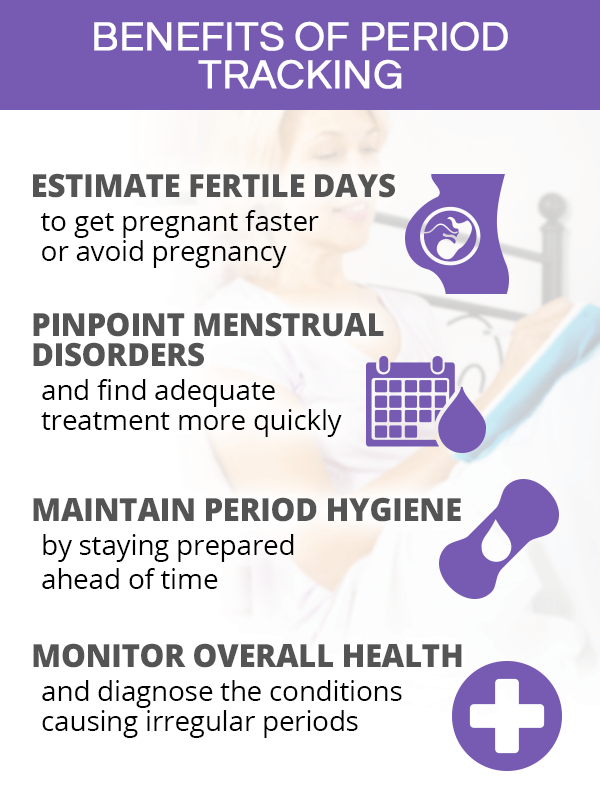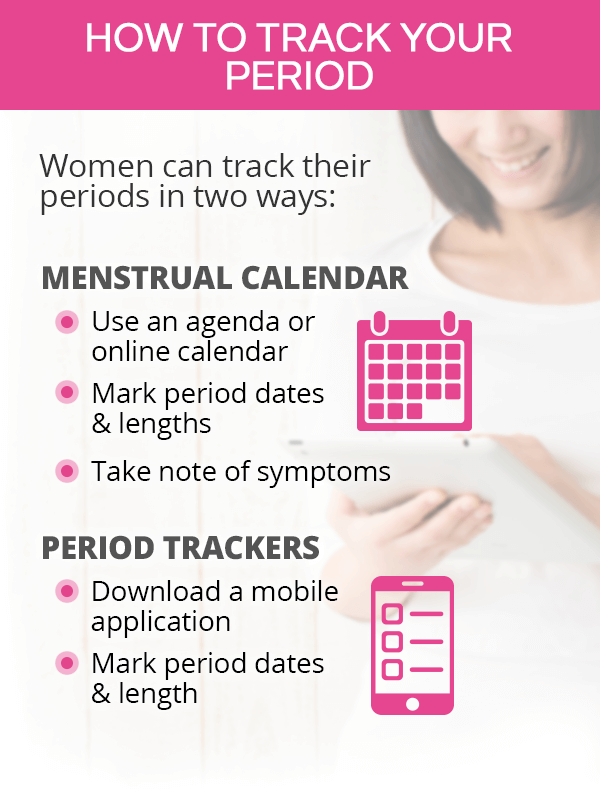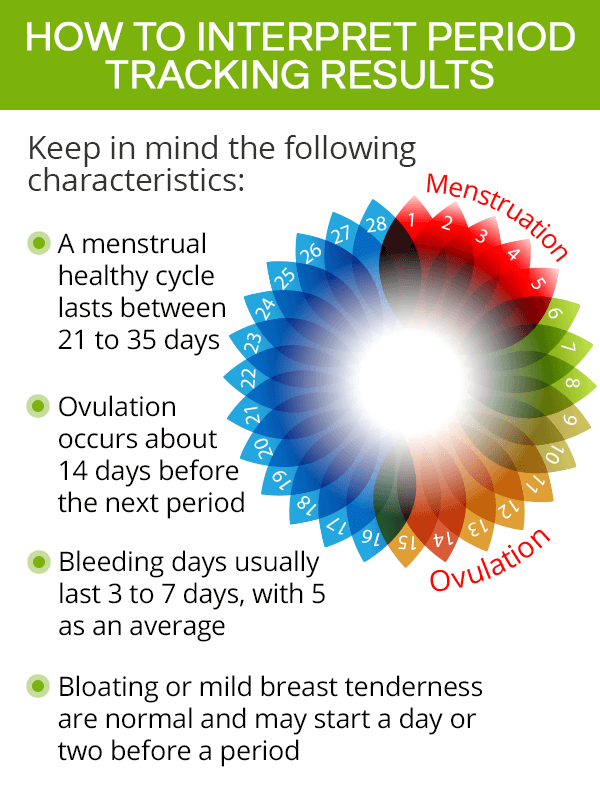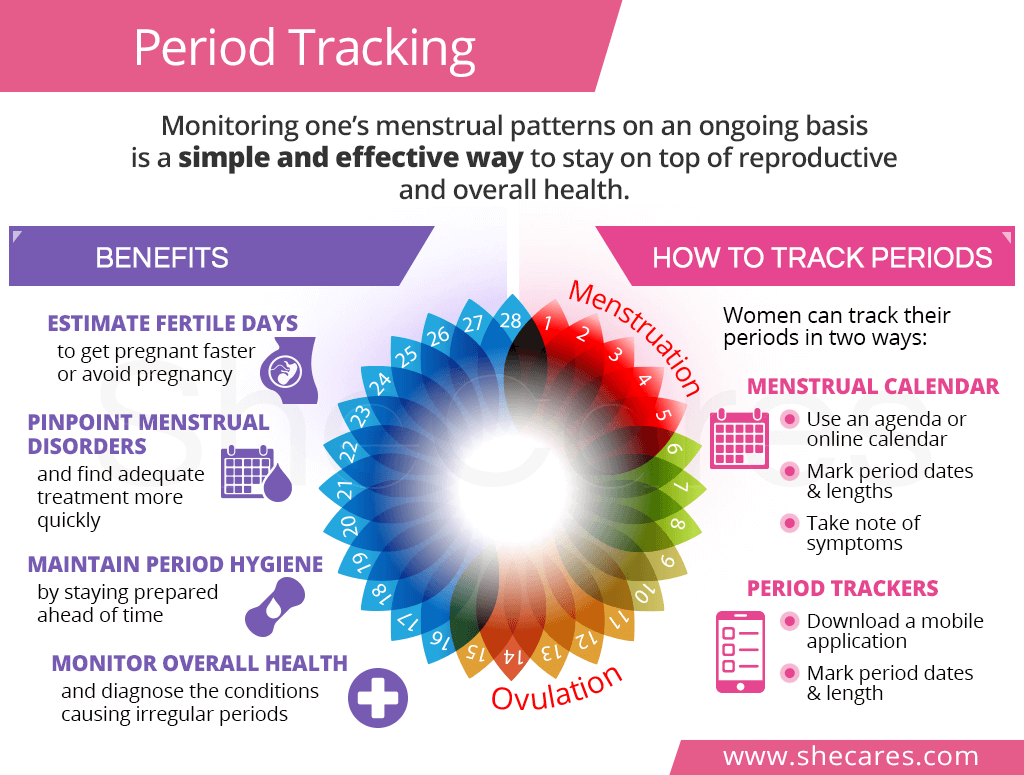What is Period Tracking?
As the name suggests, period tracking is a practice of taking note of period dates to have a better understanding of menstrual patterns.
Besides merely recording the dates of her period, a woman is encouraged to annotate others characteristics. These include the flow of menstrual discharge or symptoms experienced prior to the start of and during a period, such as cramps, bloating, mood swings, breast tenderness, and others.
Benefits of Period Tracking

The benefits of tracking periods extend way past menstruation to include physical and psychological health. Regular period tracking allows women to do the following:
Estimate Fertile Days
A woman is capable of getting pregnant only on her ovulation day and up to five days before it. Without knowing her menstrual patterns, it is much more difficult to estimate that fertile window. This is important for those who are preparing to get pregnant and for those who want to avoid pregnancy alike.
Pinpoint Menstrual Disorders
When a woman is not keeping track of her periods, she may not notice that she is suffering from irregular periods, including short cycles, heavy bleeding, or infrequent periods. She might also consider menstrual disorders, such as premenstrual syndrome (PMS), as normal, without seeking treatment.
Maintain Proper Period Hygiene
Staying fresh, clean, and healthy while on a period involves knowing when it is due and being prepared for it ahead of time. In that context, period tracking is also beneficial for maintaining period hygiene, preventing infections, and avoiding embarrassing accidents.
Monitor Overall Health
A woman's menstrual patterns are a reflection of her overall health. Because various conditions, such as thyroid disorders or anemia, can affect periods, tracking periods can be one of the quickest ways to notice the body needs more care and attention.
How to Track Your Period

How to track a menstrual cycle can be achieved in several ways and will mainly depend on a woman's personal preference and lifestyle. The two most popular period tracking methods including the following:
Maintaining a menstrual calendar. Whether a woman uses her agenda, notebook, or an online application, keeping a menstrual calendar simply consists of marking the first day of her period each cycle. She can also mark the length of her periods and any associated symptoms.
Using a period tracker. With the advent of period trackers, staying on top of one's menstrual patterns has become even simpler and more convenient. Numerous mobile applications, many of which can be downloaded for free, offer complex features to mark period dates, ovulations signs and symptoms, sexual intercourse, and more.
How to Interpret Period Tracking Results

Generally, it takes about three cycles of period tracking to notice a menstrual pattern, make a comparison to healthy menstruation, and pinpoint potential abnormalities.
To do that, it is key to keep the following characteristics in mind:1,2,3,4,5
A menstrual cycle is healthy when it lasts between 21 to 35 days, with 28 days being the average. Having periods shorter than 21 days (polymenorrhea) or longer than 35 days (oligomenorrhea) is considered irregular.
Ovulation occurs about 14 days before the start of the next cycle's period. It lasts 12 to 24 hours. Since the sperm can survive in the reproductive tract for up to five days, a woman is fertile on ovulation and up to five days before.
Bleeding usually last three to seven days, with five as an average. Total blood loss per period is 60 mL. Losing more than 80 mL (menorrhagia) or less than 30 mL (hypomenorrhea) is considered abnormal.
Normal period symptoms, like bloating or mild breast tenderness, may start a day or two before a period and end soon after its onset. Abnormal symptoms, such as intense irritability or sleep problems, start a week or two before a period and may indicate PMS.
Key Takeaways
Without a doubt, period tracking should be a non-negotiable practice for all women throughout their reproductive years. It offers numerous benefits not only in terms of reproduction, but also overall well-being. They include estimating a woman's fertile days to get pregnant faster or avoid pregnancy more effectively; pinpointing menstrual disorders to seek treatment more promptly; maintaining good hygiene by staying prepared for an upcoming period; and monitoring physical and psychological health to catch abnormalities before they develop into a more serious condition. How to track periods can be done by simply marking the dates on a calendar or using a mobile period tracker to enjoy added features. When practiced ongoing, period tracking can help women stay on top of their health for years to come.
Sources
- Epstein, D. (2017). Examining Menstrual Tracking to Inform the Design of Personal Informatics Tools. Retrieved June 15, 2020 from https://www.ncbi.nlm.nih.gov/pmc/articles/PMC5432133/
- Medline Plus. (2020). Menstruation. Retrieved June 8, 2020 from https://medlineplus.gov/menstruation.html
- Office on Women's Health. (2019). Menstrual Cycle. Retrieved June 15, 2020 from https://www.womenshealth.gov/menstrual-cycle
- The Ohio State University. (n.d.). Is it normal to miss periods? Retrieved June 15, 2020 from https://wexnermedical.osu.edu/blog/disappearing-period
- University of Washington. (2017). Period tracking apps failing users in basic ways, study finds. Retrieved June 15, 2020 from https://www.washington.edu/news/2017/05/02/period-tracking-apps-failing-users-in-basic-ways-study-finds/
Footnotes:
- The Society of Obstetricians and Gyneacologists of Canada. (n.d.). Normal Periods. Retrieved June 15, 2020 from https://www.yourperiod.ca/normal-periods/menstrual-cycle-basics/
- Informed Health.org. (2009). Heavy periods: Overview. Retrieved June 15, 2020from https://www.ncbi.nlm.nih.gov/books/NBK279294/
- Clinical Evidence. (2012). Menorrhagia. Retrieved June 15, 2020from https://www.ncbi.nlm.nih.gov/pmc/articles/PMC3285230/
- Better Health Channel. (2018). Ovulation. Retrieved June 15, 2020 from https://www.betterhealth.vic.gov.au/health/conditionsandtreatments/ovulation
- Cleveland Clinic. (2019). Abnormal Menstruation (Periods). Retrieved June 15, 2020 from https://my.clevelandclinic.org/health/diseases/14633-abnormal-menstruation-periods
